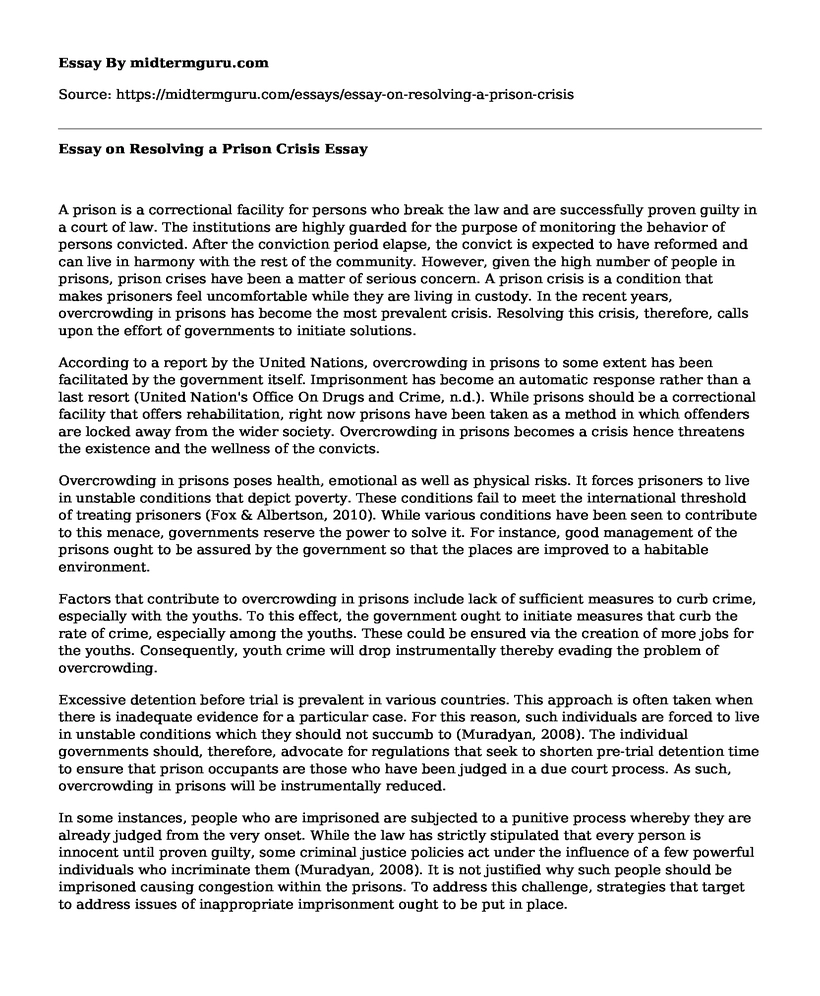A prison is a correctional facility for persons who break the law and are successfully proven guilty in a court of law. The institutions are highly guarded for the purpose of monitoring the behavior of persons convicted. After the conviction period elapse, the convict is expected to have reformed and can live in harmony with the rest of the community. However, given the high number of people in prisons, prison crises have been a matter of serious concern. A prison crisis is a condition that makes prisoners feel uncomfortable while they are living in custody. In the recent years, overcrowding in prisons has become the most prevalent crisis. Resolving this crisis, therefore, calls upon the effort of governments to initiate solutions.
According to a report by the United Nations, overcrowding in prisons to some extent has been facilitated by the government itself. Imprisonment has become an automatic response rather than a last resort (United Nation's Office On Drugs and Crime, n.d.). While prisons should be a correctional facility that offers rehabilitation, right now prisons have been taken as a method in which offenders are locked away from the wider society. Overcrowding in prisons becomes a crisis hence threatens the existence and the wellness of the convicts.
Overcrowding in prisons poses health, emotional as well as physical risks. It forces prisoners to live in unstable conditions that depict poverty. These conditions fail to meet the international threshold of treating prisoners (Fox & Albertson, 2010). While various conditions have been seen to contribute to this menace, governments reserve the power to solve it. For instance, good management of the prisons ought to be assured by the government so that the places are improved to a habitable environment.
Factors that contribute to overcrowding in prisons include lack of sufficient measures to curb crime, especially with the youths. To this effect, the government ought to initiate measures that curb the rate of crime, especially among the youths. These could be ensured via the creation of more jobs for the youths. Consequently, youth crime will drop instrumentally thereby evading the problem of overcrowding.
Excessive detention before trial is prevalent in various countries. This approach is often taken when there is inadequate evidence for a particular case. For this reason, such individuals are forced to live in unstable conditions which they should not succumb to (Muradyan, 2008). The individual governments should, therefore, advocate for regulations that seek to shorten pre-trial detention time to ensure that prison occupants are those who have been judged in a due court process. As such, overcrowding in prisons will be instrumentally reduced.
In some instances, people who are imprisoned are subjected to a punitive process whereby they are already judged from the very onset. While the law has strictly stipulated that every person is innocent until proven guilty, some criminal justice policies act under the influence of a few powerful individuals who incriminate them (Muradyan, 2008). It is not justified why such people should be imprisoned causing congestion within the prisons. To address this challenge, strategies that target to address issues of inappropriate imprisonment ought to be put in place.
Some instances that lead to imprisonment can also be solved via various procedures laid out in the constitution. Matters such as family problems can be solved at the family level rather than in courts of law. Solving these cases through such approaches ensures that people are not jailed and thereby reducing overcrowding in prisons.
In conclusion, overcrowding in prisons is a prevalent crisis that has affected these institutions. It makes the places unstable and hence it is hard to accomplish the correctional objective for which they were established to realize. The application of these solutions will, therefore, be of instrumental benefit to the prison system.
References
Fox, C., & Albertson, K. (2010). Could economics solve the prison crisis? Probation Journal, 57(3), 263-280.
United Nation's Office On Drugs and Crime. (n.d.). Addressing the global prison crisis STRATEGY 2015-2017. Retrieved from https://www.unodc.org/documents/justice-and-prison-reform/UNODC_Strategy_on_Addressing_the_Global_Prison_Crisis.pdf
Muradyan, D. (2008). California's Response to Its Prison Overcrowding Crisis. McGeorge L. Rev., 39, 482
Cite this page
Essay on Resolving a Prison Crisis. (2021, May 20). Retrieved from https://midtermguru.com/essays/essay-on-resolving-a-prison-crisis
If you are the original author of this essay and no longer wish to have it published on the midtermguru.com website, please click below to request its removal:
- Case Study: Fisher vs The University of Texas at Austin
- Essay on Motor Vehicle Theft
- Essay on Freedom Now: How People Struggle for Equal Rights
- Paper Example on Protecting the Youth From Challenges of Stop and Search Policies
- SMS Phishing: Deceitful Attack on Your Mobile Devices - Research Paper
- Juvenile vs Adult Courts: Comparing a Case Study - Essay Sample
- Jack & Diane: Juvenile Court & Constitutional Rights - Essay Sample







